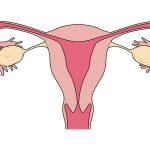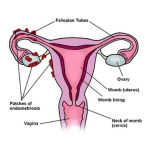Appendicitis is the inflammation, swelling and infection of the appendix. It may occur at any age but is mostly seen in youth. Appendix is a small tube-like structure attached to part of the large intestine also called colon. Appendicitis occurs when the appendix is blocked. If the blockage continues, the inflamed tissue becomes infected and die due to lack of blood supply. As a result, the appendix ruptures. The symptoms of appendicitis include abdominal pain which may even radiate to lower right abdomen. Some other symptoms include appetite loss, diarrhea, fever, frequent and painful urination, nausea and vomiting.
Appendicitis pain may start with mild cramping and becomes more steady and severe with time. According to the experts, it develops when the appendix is obstructed. Things that may block appendix may be building up of hardened stool, enlarged lymphoid follicles, intestinal worms, traumatic injury or tumors.
Appendicitis can be either acute or chronic. The symptoms develop suddenly and may be severe in case of acute. While symptoms may be mild and may take time to develop in chronic cases.
There are no home remedies for appendicitis. The treatment involves removal of appendix before the organ ruptures. The procedure is known as appendectomy. This is done in two ways:
- Laparotomy: It is the older method that removes the appendix through a single large incision in the lower area of the abdomen.
- Laparoscopic surgery: It is the latest and most preferred method that removes the appendix through 2-3 small incisions.
Most frequent complications of appendicitis
Delay in diagnosis and treatment of appendicitis increases the risk of complications. One of them is perforation which may lead to the accumulation of pus around the appendix. It may even cause infection throughout the abdominal lining. It is advised to go for surgery as soon as appendicitis is diagnosed.
Sometimes inflammation may interfere with the action of intestinal muscles and prevent bowel content from moving. Liquid and gas may accumulate above the blockage in the part of the intestine resulting in nausea and vomiting.
Diagnosis for appendicitis
The doctors may perform physical tests which checks the tenderness in the lower right part of the abdomen and swelling. The tests may include:
- Abdominal image testing to check the inflammation of the appendix- abdominal ultrasound, X-ray, CT scan. It helps the doctors identify potential causes such as pus or fecal impaction.
- Pelvic test- If you are a woman, the symptoms may be caused by an ovarian cyst or other condition affecting reproductive organ. They examine uterus, ovaries, vulva and cervix through this test.
- Pregnancy test- Ectopic pregnancy may be mistaken by appendicitis. It happens when the egg implants itself in the fallopian tube rather than the uterus. It may be a medical emergency.
- Urine test
- Blood test
Laparoscopic surgery
Since there is no known function of the appendix, to prevent the confusion, the surgeon usually removes it to prevent potential appendicitis in the future. It is a minimally invasive surgery to remove the appendix through a few small incisions. A small, narrow tube called cannula which is used to inflate the abdomen is inserted in the abdomen. This allows the surgeon to view the internal organs.
Once the abdomen is inflated, the surgeon introduces a camera and a thin tube-like instrument called a laparoscope into the abdomen. The camera will display internal images on the screen, guiding the surgeon to perform the surgery. When the appendix is found, it is tied and removed. After the removal, the incisions are cleaned, closed and dressed.
The advantages of laparoscopic surgery are reduced post-surgical pain, reduced risk of wound infection, short hospital stay and speedy recovery.
Usually, there is little time to prepare for the surgery as it is often an emergency procedure. A person is asked to follow some instructions before surgery:
- When the stomach is empty, it becomes easy for the surgeon to see the abdomen and perform surgery. Therefore, the patient is refrained from eating for atleast 7 hours before the surgery.
- Avoid taking medicines on the day of the surgery.
Other treatment options for appendicitis
The treatment options may depend on your condition, which may include one or more of the following:
- Surgery to remove the appendix
- Surgery to drain pus or abscess
- Pain killers
- Antibiotics
- Liquid diet
There are rare cases that appendicitis may get cured without surgery. Surgery is the most common, preferred and permanent treatment for appendicitis. After surgery, your doctor may prescribe antibiotics and pain relievers to support the recovery. Along with the medication, the doctor recommends:
- Take rest
- Increase fluid intake
- Gentle walking regularly
- No lifting heavy objects and do not indulge in strenuous activities
- Keep your surgical incision site clean
Conclusion
Appendicitis is a medical emergency which needs immediate attention and medical care. Consult a doctor if you see the symptoms or get yourself diagnosed. Swift diagnosis and treatment reduce the chances of appendix being burst.







